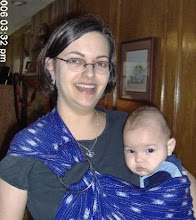No doubt about it, the gap between what our culture teaches us to expect of the sleep patterns of a young child (read them a story, tuck them in, turn out the light, and not see them again for 8 hours) and the reality of how children actually sleep if healthy and normal, yawns widely.
But the first steps to dealing with the fact that your young child doesn't sleep through the night, or doesn't want to sleep without you is to realize that:
- (1) Not sleeping through the night until they are 3 or 4 years of age is normal and healthy behavior for human infants.
- (2) Your children are not being difficult or manipulative, they are being normal and healthy, and behaving in ways that are appropriate for our species.
Once you understand these simple truths, it becomes much easier to deal with parenting your child at night. Once you give up the idea that you must have 8 hours of uninterrupted sleep at night, and view these nighttime interactions with your child as precious and fleeting, you get used to them very quickly.
Monday, May 19, 2008
Sleeping through the night
Anthropologist Kathy Dettwyler has a neat commentary on her website on the subject of Sleeping Through the Night:
Sunday, May 18, 2008
Too much water raises seizure risk in babies
With summer and the hot weather coming on, it's a good time to remind parents that babies who are not eating solids should not drink water, and too much can cause seizures.
Timing Contractions
This looks handy: Contraction Master. For those of you who like to live-blog labor.
Saturday, May 10, 2008
The Culprit
 or, "how we spent our afternoon".
or, "how we spent our afternoon".Can you identify this object? (not the Penny, the white thing) If you look closely, the slight yellow at the top is actually ear wax, which it acquired while spending several hours in my two-year-old's ear. This small piece of plastic caused no physical damage, just a blow of $50 to our bank account. With only the small end visible, it was impossible to identify the object, and thus to determine how far into the ear canal it actually went. Not that far, as it turns out. In fact, we might not have even known had my unusually verbal son not said, "Mommy, take off ear!".
Tuesday, May 06, 2008
In the News
Some interesting items in the news this week about pregnancy, breastfeeding, and child care:
The rates of pregnant women with diabetes is soaring.
While the news that More Mothers Breast-Feed, in First Months at Least is exciting (especially the increase among African-American moms), the number of babies still breastfed at six months remain unchanged. And there are other questions about the collection of data:
and further:
and hospitals have still not banned the bags:
Breast cancer risk cut by breast feeding (not if you live in Tanzania, though) although a Brittish poll found that 75% of moms are not aware of that benefit.
And while it isn't exactly "news", more studies confirm that Breastfeeding will improve children's IQ scores.
Just in case you needed something else to worry about, extra iron for infants who don't need it might delay development, arsenic in baby rice puts children at risk, children are more vulnerable to harmful effects of lead at age 6 than as toddlers, and nearly one-third of U.S. parents don't know what to expect of infants.
The rates of pregnant women with diabetes is soaring.
While the news that More Mothers Breast-Feed, in First Months at Least is exciting (especially the increase among African-American moms), the number of babies still breastfed at six months remain unchanged. And there are other questions about the collection of data:
The most recent C.D.C. survey did not report breast-feeding rates at 6 months because of a lack of data.
Dr. Barbara L. Philipp, associate professor of pediatrics at Boston University, said the C.D.C. survey had not asked mothers whether they breast-fed exclusively. “One sip was positive, so they set the bar very low,” Dr. Philipp said.
Dr. Philipp said that while doctors and nurses were doing a better job of emphasizing the benefits of breast-feeding to patients, most continue to offer new mothers free diaper bags containing infant formula when mothers go home with their newborns.
“That’s a problem because at least five studies have shown that when a doctor or nurse hands the family that bag, even if they take the formula out, that mother will have less success with breast-feeding,” Dr. Philipp said.
Breast cancer risk cut by breast feeding (not if you live in Tanzania, though) although a Brittish poll found that 75% of moms are not aware of that benefit.
And while it isn't exactly "news", more studies confirm that Breastfeeding will improve children's IQ scores.
Just in case you needed something else to worry about, extra iron for infants who don't need it might delay development, arsenic in baby rice puts children at risk, children are more vulnerable to harmful effects of lead at age 6 than as toddlers, and nearly one-third of U.S. parents don't know what to expect of infants.
Subscribe to:
Posts (Atom)





